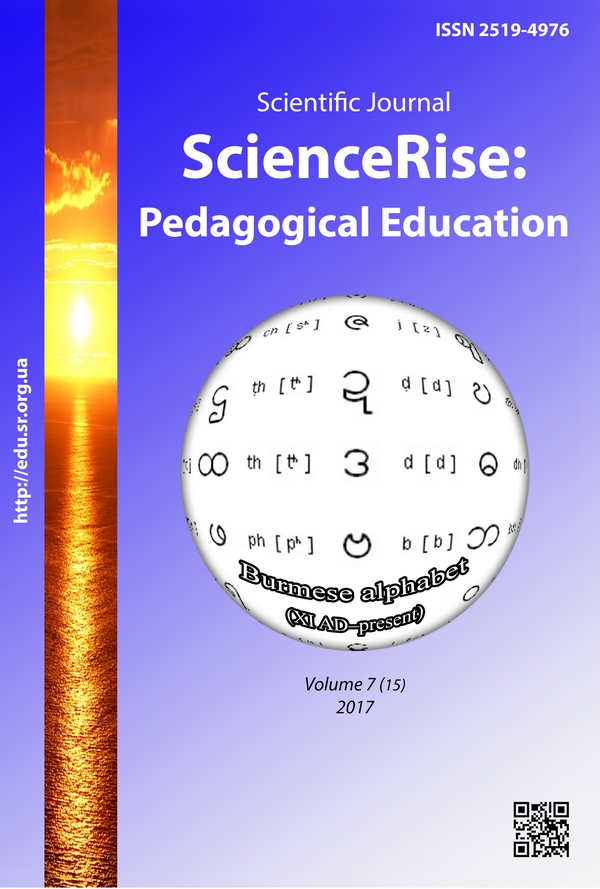Формування у студентів навичок відтворення світогляду і образу письменника при вивченні його біографії
DOI:
https://doi.org/10.15587/2519-4984.2017.107980Ключові слова:
підготовка студентів, навички, біографія письменника, цінності, світогляд, образ, портрет, аксіосфераАнотація
У дослідженні розкривається логіка формування у студентів-філологів навичок відтворення світогляду письменника та його образу. Цей етап підготовки до вивчення біографії письменника передбачає моделювання ними образу письменника як людини, митця, патріота, громадянина, трудівника (зовнішній і внутрішній портрет). Тому студенти набували практичних навичок роботи з портретом, біографікою, з виявлення світоглядних цінностей письменника та його епохи, поєднання їх з програмовим твором та включення у структуру уроку
Посилання
- Metodyka prepodavanyya lyteraturi v sovetskoy shkole (1969). Khrestomatyya. Moscow: Prosveshhenye, 375.
- Ghladyshev,V. V. (1995). Vykorystannya avtobioghrafichnykh materialiv u procesi vyvchennya zhyttya i tvorchosti pysymennyka v kursi zarubizhnoyi literatury (XI klas). Kyiv, 23.
- Bondarenko, Yu. (2009). Filosofsyko-istorychni pidkhody do vyvchennya bioghrafiyi pysymennyka. Vsesvitnya literatura ta kulytura v navchalynykh zakladakh Ukrayiny, 4, 5–7.
- Miroshnychenko, L. F. (2007). Metodyka vykladannya svitovoyi lteratury v serednikh navchalynykh zakladakh. Kyiv: Vyshha shkola, 415.
- Ostrovska, G. O. (2015). Orghanizaciya navchalynogho procesu z formuvannya ghotovnosti maybutnikh uchyteliv literatury do vyvchennya bioghrafiyi pysymennyka. Science and Education a New Dimension: Pedagogy and Psychology, 3 (43), 39–42.
- Ostrovska, G. O. (2013). Aktyvyzacyya poznavatelynoy deyatelynosty studentov pry yzuchenyy byoghrafyy pysatelya. Science and Education a New Dimension: Pedagogy and Psychology, 9, 102–105.
- Ostrovska, G. O.; Lapenok, M. Y., Avdeeva, Y. N. (2013). Teoretychne obgruntuvannya systemy pidghotovky maybutnikh pedaghoghiv do vyvchennya u shkoli bioghrafiyi pysymennyka. Teoryya y tekhnologhyya obuchenyya fylologhycheskym dyscyplynam v vuze y shkole. Belgorod-Sevastopol-Kharkiv: Vyd-vo Virovecy A. P. «Apostrof», 281–302.
- Ostrovska, G. O. (2016). Axiological component of teacher training (the teachers of literature in particular). Intercultural Communication: Pedagogical approach, 1 (1), 101–113. Avaliable at: http://interculturalwsge.com/opublikowane-numery/8
- Fylosofskyi encyklopedycheskyi slovar (2002). Moscow: YNFRA-M, 576.
- Maslova, V. A. (2007). Homo lingualis v kulture. Moscow: Ghnozys, 318.
- Sokhan, L. (1988). Kultura zhyzny lychnosty: problemi teorii y metodologhii socyalno-psykhologhycheskogho issledovaniya. Kyiv: Naukova dumka, 189.
- Vynoghradov, V. V. (1971). O teorii khudozhestvennoy rechi. Moscow: Visshaya shkola, 239.
- Vylichynskaya, T. F. (2013). Obraz avtora khudozhestvennogho teksta v paradyghme sovremennikh lynghvystycheskykh issledovanyi. Uchenie zapysky Tavrycheskogho nacyonalnogho unyversyteta im. V. Y. Vernadskogho. Seriya «Fylologhiya. Socyalnie kommunykacyi», 26 (1), 190–194.
- Ostrovska, G. O. (2014). Aksiosfera uroku literatury. Naukovyi oghlyad, 5 (6), 109–116.
##submission.downloads##
Опубліковано
Як цитувати
Номер
Розділ
Ліцензія
Авторське право (c) 2017 Galina Ostrovska

Ця робота ліцензується відповідно до Creative Commons Attribution 4.0 International License.
Наше видання використовує положення про авторські права Creative Commons CC BY для журналів відкритого доступу.
Автори, які публікуються у цьому журналі, погоджуються з наступними умовами:
1. Автори залишають за собою право на авторство своєї роботи та передають журналу право першої публікації цієї роботи на умовах ліцензії Creative Commons CC BY, котра дозволяє іншим особам вільно розповсюджувати опубліковану роботу з обов'язковим посиланням на авторів оригінальної роботи та першу публікацію роботи у цьому журналі.
2. Автори мають право укладати самостійні додаткові угоди щодо неексклюзивного розповсюдження роботи у тому вигляді, в якому вона була опублікована цим журналом (наприклад, розміщувати роботу в електронному сховищі установи або публікувати у складі монографії), за умови збереження посилання на першу публікацію роботи у цьому журналі.









